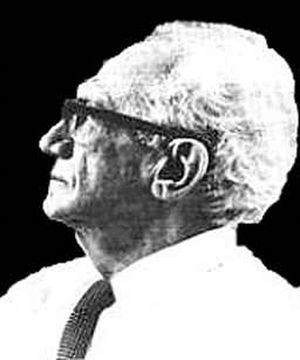Thomas Lee Ferté (5 Dec 1936 – 9 Jun 2009)[1]Obituary, The Oregonian 13 Jun 2009[2]Thomas Lee Ferte Social Security Death Index, at FamilySearch.org (Tom Ferté) has taught courses on Velikovsky, written about Velikovsky and his record of success, and founded the journal Chiron. Before retiring, he taught mythology and writing at Oregon College of Education, Monmouth.
Course on Velikovsky
Ferté taught:
:The Velikovsky Revolution.
“An examination of the theories of Immanuel Velikovsky and their relationship to modern mythic analysis, history, psychology, and the sciences, with special emphasis on the potential contribution of Velikovskian catastrophism to generative myth.” . Winter, 1973.[3]Pensée Vol. 3 No 1: (Winter 1973) “Immanuel Velikovsky Reconsidered III” (page 37)
A Record of Success
In 1972 Ferté wrote for Pensée the article: “A Record of Success”[4]”A Record of Success”, Pensée Vol. 2 No 2: (May 1972) “Immanuel Velikovsky Reconsidered I”
Chiron
In 1974, Ferté founded the journal Chiron, which ran for one issue.
Criticism of Velikovsky
C. Leroy Ellenberger reports that:
“As a counterpoint, in 1978 Thomas Ferte prepared an analysis of Velikovsky’s arguments and evidence, “The 360-Day Year: An Alternative Interpretation,” in which he noted that “Velikovsky’s conclusion is attached to far too many undocumented (and largely unsupportable) assertions” (p. 32), and that “Velikovsky fails to consider (1) the Sumerian sexagesimal system, (2) the theory of mythological diffusion, and (3) the relationship of ancient man’s numerology to his overall mythoaesthetic needs” (p. 40). Ferte argues that invariably a 360-day calendar was accompanied by the addition of five epagomenal days, something Velikovsky eschewed and discounted. Suffice it to say, Velikovsky was not pleased with Ferte’s analysis and Kronos deigned not to print it.”[5]C. Leroy Ellenberger, “The Mars-Earth Wars Theory: A Critical Analysis”, Catastrophism and Ancient History XII:1 (Jan 1990)
Lewis M. Greenberg notes that on:
“.. Thomas Ferte’s paper on calendars. KRONOS did decide to print that paper, but Ferte supposedly had other plans for the piece, changed his mind (as he was wont to do), and refused to release it to us for publication. The fact that KRONOS VII:l carried another one of Ferte’s articles, submitted at the same time as the calendars paper, proves that we had no aversion to his work.”[6]Lewis M. Greenberg, “Discussion: Of Ponderosas and Heinekens”, Aeon III:2 (May 1993)
References
Selected bibliography
- Thomas L. Ferté, “A Record of Success”, Pensée Vol. 2 No 2: (May 1972) “Immanuel Velikovsky Reconsidered I”
- Thomas L. Ferté: “Velikovsky’s Frogs: The Unscientific Reception of Worlds in Collision (1950-74)”, Chiron: Journal of Interdisciplinary Studies, Volume 1, Numbers 1 & 2, Winter-Spring 1974
- Thomas L. Ferté, “Collective Amnesia: A Brief History of the Concept”, Kronos Vol. VII No. 1 (Fall 1981)
External links
- Thomas L. Ferté Papers, 1961-2000 at Portland State University Library
References
| ↑1 | Obituary, The Oregonian 13 Jun 2009 |
|---|---|
| ↑2 | Thomas Lee Ferte Social Security Death Index, at FamilySearch.org |
| ↑3 | Pensée Vol. 3 No 1: (Winter 1973) “Immanuel Velikovsky Reconsidered III” (page 37) |
| ↑4 | ”A Record of Success”, Pensée Vol. 2 No 2: (May 1972) “Immanuel Velikovsky Reconsidered I” |
| ↑5 | C. Leroy Ellenberger, “The Mars-Earth Wars Theory: A Critical Analysis”, Catastrophism and Ancient History XII:1 (Jan 1990) |
| ↑6 | Lewis M. Greenberg, “Discussion: Of Ponderosas and Heinekens”, Aeon III:2 (May 1993) |
